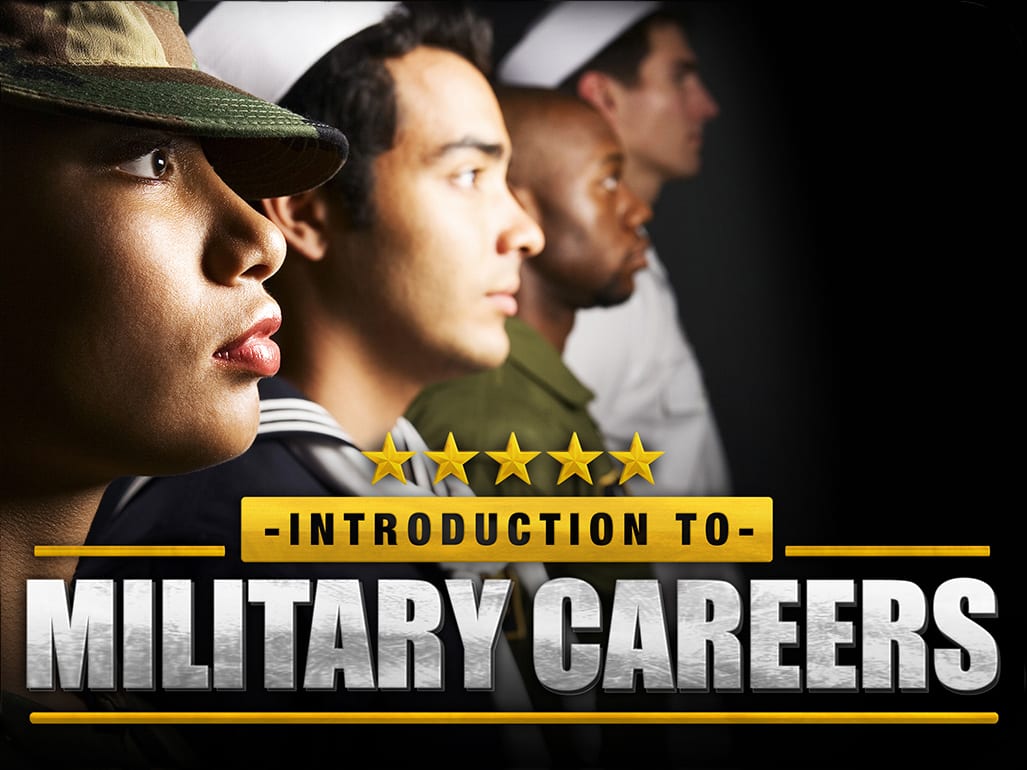
Introduction to Military Careers
Do you really understand how the military works or what it can do for you? The military offers far more career diversity than most people imagine. You will learn about the five military branches – Air Force, Army, Coast Guard, Marines Corps, and Navy – and examine which jobs you might like to pursue. From aviation to medicine, to law enforcement, the military can be an outstanding place to achieve your dreams in a supportive and well-structured environment.
Units at a Glance
Unit 1:Welcome to the Military
You may have dreams of accomplishing an epic flyby as the best of the best naval aviators; becoming an elite member of a Special Forces unit so you can take down the world’s most dangerous terrorists; or becoming the first person to walk on Mars successfully. The military is certainly the place to fulfill these dreams. But what do you really know about the 12 service branches of the United States military? In this unit, we’ll examine the two types of military service, discuss the different branches and their unique missions, and highlight some of the historical successes and unsung heroism of each. By the end of this unit, you will definitely have a better sense of not only the differences amongst each military branch, but also which one sounds like a good fit for you.
What will you learn in this unit?
- Identify the unique mission of each branch of the U.S. military.
- Understand the basic history of each branch, including some of its major successes.
- Explain how the military fits within the U.S. government.
- Discuss the requirements for active duty and part-time duty military service and understand the differences.
Unit 2: Military Aviation Careers
If you’ve seen that famous movie featuring confident naval fighter pilots fighting for first place over the desert skies of California, you may think you know what military aviation is like: the roar of a jet, the breathless landings on an aircraft carrier in the middle of a midnight-blue sea, the swagger of a pilot who has just seemed to defy gravity with ease, the heroic efforts to defend a border or rescue a stranded vessel off of an enemy coast. You’re not wrong, but this picture of aviation is just one part of this incredibly demanding yet adventurous and competitive career path. In this unit, you’ll learn about the opportunities available in aviation, across the branches, and the many different talents that each job requires.
What will you learn in this unit?
- Understand the two different career paths that military personnel can take in aviation.
- Identify and describe the responsibilities of each type of aviator.
- Describe the four types of aviation support career paths.
- Understand the relationship between aviators and aviation support careers.
Unit 3: Logistics, Supply, & Transportation Careers in the Military
Have you ever seen a caravan of large military trucks heading down the highway? It’s an impressive sight whenever you see the military on the move. More than likely what you saw was a small snapshot of the logistics and transportation division of the military when it’s on the move. Though they get very little attention—as in most people don’t think about them at all—careers in these fields are the backbone of the working military. Whether responsible for planning and analyzing potential needs, stocking and restocking supplies for soldiers, or getting those supplies to the people who need them most, these jobs literally and figuratively support the troops in the most important way possible. These are the unsung heroes of the military.
What will you learn in this unit?
- Identify the differences between logistics, supply, and transportation careers.
- Understand the role of logistics to the success of military campaigns.
- Discuss how logistics, supply, and transportation work together to aid soldiers and missions.
- Recognize how logistics and supply careers affect every part of a soldier’s life.
Unit 4: Law & Order in a Uniform
You might imagine a military law career to be a lot like a civilian legal career. To a certain degree, it is. Crimes and punishable offenses are dealt with by the police and perpetrators are forwarded for trial. But that’s about where the similarities end. The military legal system and its career track have their own unique language, set of laws, and punishments. In this unit, you’ll learn about the two types of career tracks, along with the jobs that people do in each, as well as the legal world of the military. In the process, you’ll understand the kind of people who may be attracted to a career in military law.
What will you learn in this unit?
- Describe the career tracks available in military law.
- Understand how the military legal environment differs from the civilian one.
- Identify some of the types of law that military lawyers practice on a regular basis.
- Recognize how all of the career tracks fit together.
Unit 5: Boots on the Ground: Combat Operations Careers
The military is a huge organization full of careers of every type. Every military base is more like a large city than a small business. Though you can find doctors, lawyers, dentists, human resource specialists, accountants, chefs, and child care specialists within the military, the military has one purpose: to be ready to win battles. That challenge is a serious one, and it requires an enormous amount of expertise and training. The careers that focus on combat operations, then, are the heart of the military’s mission: to defend our interests, our borders, and our citizens. People in these careers are the workers who are ready to respond at a moment’s notice, who are well trained in battlefield tactics, and who can perform the essential jobs needed to defeat the enemy and bring soldiers home safely. These are the careers of those who face danger and do not flinch. If every soldier is a hero, those in combat operations are the superheroes.
What will you learn in this unit?
- Identify the different types of combat operations careers available in the military.
- Understand the differences between the types of jobs.
- Explain why the Marines have a different combat readiness program.
- Discuss the training differences between special operations combat soldiers and more traditional combat careers.
Unit 6: Military Brains: Technology, Engineering, Intelligence
Think about some of the smartest people you know. They are usually the people who are always coming up with new ideas; who can speak multiple languages; can crack an entire crossword puzzle faster than you can figure out 17 down; or people who can take something apart, fix it, and put it back together without looking at a single instructional manual. These wizards of technology, engineering, and intelligence are the people who keep the military humming from the inside out and manage to fix almost anything just in the nick of time. Every career in every branch of the military requires intelligence and passion. These jobs, however, require a special set of skills that may be the perfect description of your strengths and talents. If they are, you most certainly will have a home here.
What will you learn in this unit?
- Identify the skills necessary to be a part of the information technology division of the military.
- Discuss how signal specialists maintain communication throughout the military and why their roles are essential.
- Understand what people with military intelligence careers do.
- Describe the role of civil engineers in the military.
Unit 7: Military Behind the Scenes
In The Wizard of Oz, Dorothy is surprised to learn that the magnificent Wizard is actually a regular man hiding behind a curtain with a pretty impressive set of machinery. It’s a surprise that has created the saying “the man behind the curtain,” implying that sometimes the big show is actually happening behind the scenes. It’s no different in the military, mostly because so many of the important careers in the military are the ones that no one pays much attention to. In this unit, we’ll pull back the curtain on some of these careers. We’ll focus on business and finance, public affairs, music, chaplain services, and food services, showing you both what they do and why they are so crucial to the success of the United States Armed Forces.
What will you learn in this unit?
- Understand the role of business administration and human resources careers in the military.
- Explain how public affairs careers help shape the way that the public understands the military.
- Describe how military music careers work and the opportunities that come with them.
- Identify how a chaplain helps soldiers and military families.
- Discuss how culinary services support the lives of military personnel.
Unit 8: Private Practice or General Practice?: Military Medical Services
When you think of military medical care, do you picture a cot in a dusty tent with only some gauze to treat a wound? Patching someone up in the back of a Humvee while it screams across a battlefield? For combat medics, that picture may be more true than not.But military medical services are far more sophisticated than you may imagine.Military medical care spans basic preventive care to combat medicine, to dietetics, to research-driven roles in the lab, all with one goal: improve the lives of soldiers and their families.In this unit, you’ll learn about the different facets of military medical care and how the military combines these facets to serve soldiers, veterans, dependents, and the global community as a whole.
What will you learn in this unit?
- Identify the three types of medical careers the military offers.
- Describe the responsibilities of military-specific medical fields.
- Understand how the different medical careers work together to serve soldiers.
- Discuss the diversity of skills and interests that military medical careers attract.
Required Materials
- Microsoft Word or another document software


